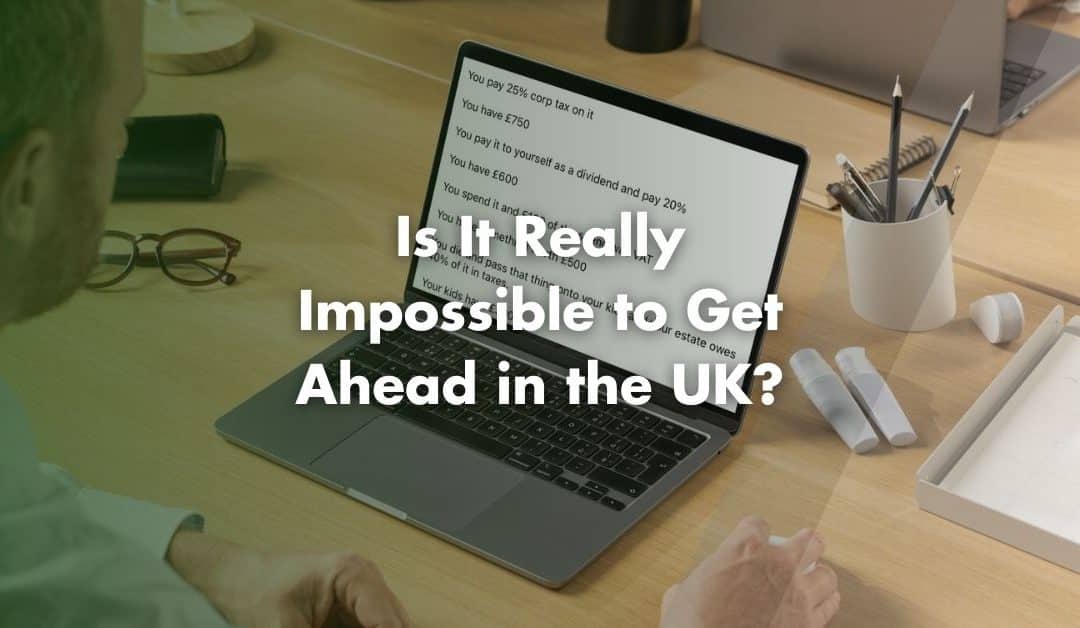A recent Facebook post recently claimed that if you earn £1,200 in your business, you only leave your children with £300 after tax. The post blames high UK taxes and claims this is why people are leaving the country.
But how true is this?
The Starting Point: A Sale Worth £1,200
The example begins with a business making a sale of £1,200. This includes £200 of VAT (Value Added Tax), which the business needs to pass to HMRC. That leaves £1,000 as the business’s actual revenue. The £200 never would have been yours.
Step 1: Paying Corporation Tax
The Corporation Tax rate is 19% for small companies with profits under £50,000. That means the business pays £190 in Corporation Tax on the £1,000 profit. The remaining £810 can be paid out to the business owner as a dividend.
The social post in question incorrectly uses the 25% rate, which only applies to larger businesses with profits over £250,000. For most small companies, the lower rate is what actually applies.
Step 2 : Taking the Money as Dividends
Next, the business owner pays themselves the £810 as a dividend. In the current tax year, the Dividend Allowance is £500. This means the first £500 of dividend income is tax-free.
The remaining £310 is taxed at 8.75%, which is the basic dividend rate. That results in a tax bill of £27.13. After tax, the individual keeps £782.87.
Step 3: Spending the Money
Now, let’s say the person spends all the money on goods and services that include VAT. If they spend the full £782.87, about £130.48 of that goes to HMRC in VAT. That means they receive £652.39 worth of actual goods or services.
The original post claimed only £500 of value was received and that £100 went to VAT. As we can see, that figure underestimates the real value.
Step 4: Inheritance Tax on Death
Finally, the post suggests that after you die, your children would owe 40% Inheritance Tax on this £500 item, leaving them with just £300.
But here’s the truth. Everyone in the UK gets an Inheritance Tax Allowance of £325,000, plus a potential £175,000 Home Allowance. That adds up to a possible £500,000 tax-free threshold.
Unless your total estate is worth more than that, no Inheritance Tax is due. So, if you’re only passing down £652.39 in assets, your children wouldn’t pay a penny in tax.
So, What is the Real Outcome?
Here’s a breakdown of what really happens:
- Business earns £1,000 after VAT
- Pays £190 in Corporation tax
- Receives £810 in dividends
- Pays £27.13 in dividend tax
- Keeps £782.87 in hand
- Spends it, with £130.48 going to VAT
- Ends up with £652.39 worth of goods
- Passes them on to children tax-free
The children don’t get £300. They actually receive the full £652.39.
Contact Us For Any and All Questions
Yes, the UK tax system is complex, but the idea that you are left with just a quarter of what you earn is based on incorrect maths. With the right knowledge and planning, you can keep much more than the post suggests.
Don’t let social media mislead you. The numbers speak for themselves.
We are Chartered Accountants with one of the most reputable and premium accounting bodies. We are registered and regulated by ACCA; so you can rest assured that you are in good hands. Knowing this, don’t hesitate to get in touch with us: Pi Accountancy | Contact Us
This article is for general informational purposes only and does not constitute legal or financial advice. While we aim to keep our content up to date and accurate, UK tax laws and regulations are subject to change. Please speak to an accountant or tax professional for advice tailored to your individual circumstances. Pi Accountancy accepts no responsibility for any issues arising from reliance on the information provided.

